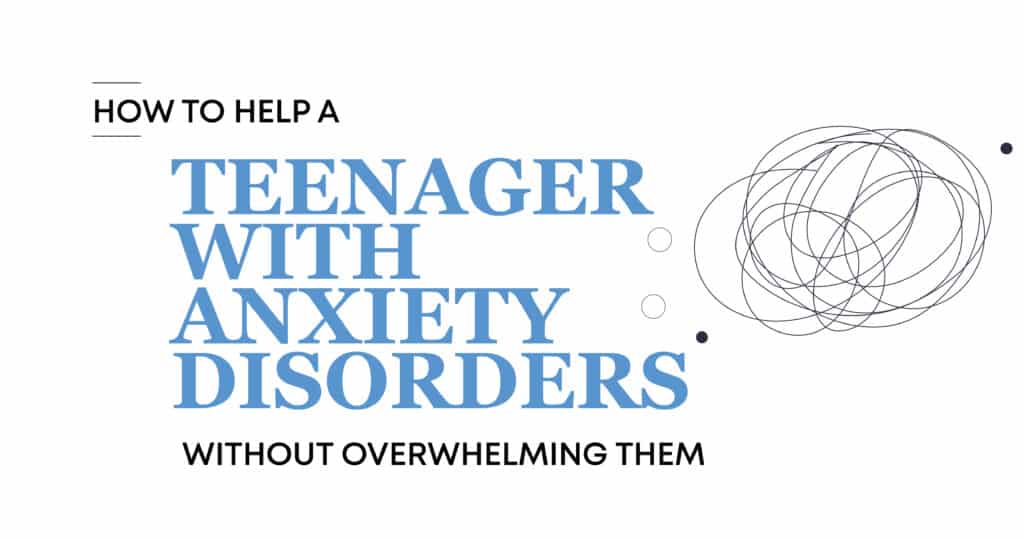Watching your teen get tangled up with anxiety in adolescence can feel like trying to pull someone out of quicksand without sinking yourself. You want to do something to make them feel better. But sometimes the more you try, the more you both end up drowning in frustration.
The thing is, you’re not supposed to “fix” it all in one swoop. That’s not how anxiety symptoms in teens work. What does work? Noticing the signs early, figuring out what might be causing it, and learning how to actually support them in a way that doesn’t make things worse.
In this guide, we’ll walk through it all, from how many teens have anxiety (you might be surprised) to what it can look like, what might set it off, and how you can respond in a way that doesn’t push your kid away.
Understanding Anxiety in Adolescents
Anxiety is more than feeling “extra nervous” or “overthinking a little.” It’s your brain ringing the panic bell, even when there’s no real danger. And for teens, this can be constant. Worrying nonstop. Overanalyzing conversations. Feeling dread about school, friendships, or the future for no obvious reason.
Some stress is normal. But when that nervous energy becomes a daily weight, disrupting their sleep, school, and ability to even breathe normally? That’s when it’s not just stress, it’s an anxiety disorder.
Teens who are truly struggling aren’t just being “dramatic.” They’re fighting a battle inside that most of us can’t see.
How Many Teens Have Anxiety – And Why It’s Rising
About 1 in 3 teens deal with some form of anxiety disorder. So if you’re wondering what percent of teens have anxiety, that’s roughly about 32%. Why is it more common now? There are numerous reasons:
- Social media. The comparison game is nonstop. Not to mention cyberbullying.
- Academic pressure. Tests, applications, expectations. It never lets up.
- World stress. Climate crises, wars, pandemics. It’s all in their face, 24/7.
- Home stress. Divorces, money issues, and illness.
The world feels heavier now. And our teens are carrying way more than we did at their age.
Early Signs of Anxiety in Teens You Shouldn’t Ignore
Signs of anxiety in teens aren’t always obvious. They don’t always cry for help. They might not even realize they need help. Sometimes they’ll act out, sometimes they’ll shut down. It can look like moodiness or laziness, but what’s really going on could be way deeper.
Here’s what you might notice:
- Restlessness or constantly feeling “on edge”
- Frequent stomach aches or headaches with no clear reason
- Avoiding friends or quitting stuff they once loved
- Insomnia, trouble falling asleep, or staying asleep
- Getting angry over small issues
- Freezing up during tests, games, or even simple activities
- Obsessive thoughts about grades, social status, or their future
If you’re ticking off a few of these signs, and they’ve been around for a while, that’s your cue. And it doesn’t mean panic. It just means now’s a good time to act calmly.
Common Triggers Behind Teenage Anxiety Disorders
What actually sets off anxiety in teens? It’s not always one big dramatic event. More often, it’s a bunch of little things piling up until they can’t take it anymore. Or maybe it’s one big change they just don’t know how to process yet. And sometimes? It’s just how their brain’s wired.
Here are some of the most common anxiety triggers in teens:
- School pressure. Tests, essays, grades, and “what’s next?” can feel like a constant storm.
- Friend drama or peer pressure. Fitting in feels like survival at this age.
- Family stress. Fighting at home, divorce, and health scares.
- Big changes. New schools, breakups, moving to a new town, losing a loved one.
- Body image struggles. Social media.
- Genetics. Sometimes it just runs in the family.
And remember, every teen is different. What flips the panic switch in one teen might not bother another at all.
Common Anxiety Triggers in Teens
| Trigger | What It Might Look Like |
| School Stress | Avoiding school, panic attacks before tests |
| Friendships | Isolation, clinginess, fear of being judged |
| Family Issues | Acting out at home, withdrawal, anger |
| Life Changes | Regression, clinginess, and depression symptoms |
| Body Image Struggles | Obsessive checking, negative self-talk |
What really matters is noticing patterns. Is something always setting them off? Is there a time of day or week when things get worse? That’s your clue.
What to Say (and What Not to Say) to a Teen With Anxiety
Talking to a teen about their anxiety can be a delicate topic. You might feel like you’re walking on eggshells. One wrong word and their walls go up. So, what should you say? And what should you absolutely not say?
Here’s a quick cheat sheet for what helps:
- “I’m here for you. No pressure.” Sometimes they just need to know they can talk, even if they don’t think they do.
- “It’s okay to feel how you’re feeling.” Validation is everything.
- “You’re not alone in this.” Makes a huge difference.
- “We’ll figure this out together.” They need to feel like you’re on their team.
And now for things you should not say. These will shut the whole conversation down fast:
- “Just relax.” Honestly? If they could, they would.
- “It’s not a big deal.” It feels like a big deal to them.
- “You’re overreacting.” This one stings. Anxiety already makes them feel “too much.”
- “Other kids have it worse.” Yeah… don’t.
Learning how to help a teenager with an anxiety disorder starts with communication. Just honest, kind, consistent talk. It might feel awkward sometimes. That’s normal.
Treatment Options: From Therapy to Medication
Let’s say you’ve noticed the signs. You’ve talked. And now you’re realizing your teen needs more support than just heart-to-hearts at bedtime. What should you do?
There are many real and proven treatment options that you can try out.
How Professional Support Helps Teens Manage Anxiety
| Treatment | How It Helps Teens |
| Therapy (CBT) | Teaches coping strategies, rewires anxious thinking |
| Medication | Balances brain chemicals when therapy isn’t enough |
| Support Groups | Builds connection, reduces isolation |
| Healthy Lifestyle Changes | Boosts overall mental resilience |
| Mindfulness Practices | Lowers day-to-day anxiety symptoms |
Not every teen will respond to the same thing. Some will love therapy. Others might hate it. That’s okay. The goal is to keep trying until something clicks.
How to Stay Involved Without Overstepping
This part can be tricky. Being a parent or caregiver means finding that awkward balance between being there and backing off.
You don’t want to smother them, but you also don’t want to seem like you’ve checked out. So here’s how you stay involved without crowding their space:
- Ask instead of assume. Rather than “You need to go to therapy,” try “Would it help to talk to someone who understands this better?”
- Support over solving. They don’t always want fixes. They want someone in their corner who listens.
- Respect boundaries. If they need space, give it, but stay close. Be available.
- Keep showing up. Even if they act like they don’t care. Even when they push back. Your consistency matters more than you know.
- Celebrate the little stuff. If they got through a rough week or spoke up in class, that’s a win. Cheer it on.
Worried About Your Teen? Hillside Horizon for Teens Is Here to Help
If you’re feeling overwhelmed, just know this: You don’t have to do this on your own.
At Hillside Horizon for Teens, we specialize in helping teens who are dealing with anxiety disorders, and we focus on meeting families where they are. No judgment. No pressure. Just honest, supportive help.
Whether your teen needs therapy, someone to talk to, or even just a calm space to work through their feelings, we’re here for that.
Contact Hillside Horizon for Teens if you’re ready to get your teen the help they need.
FAQs
How can I help my teenager with anxiety?
Start simple. Just be there. Listen without interrupting or rushing to fix. Let them lead the way and gently offer therapy or other help if they seem open. Remember, small steps add up over time.
What are the signs of anxiety in teens?
Watch for mood swings, changes in sleep or appetite, avoiding friends or school, physical issues like headaches or stomach aches, and lots of worrying. Even “attitude” can be anxiety in disguise.
What causes anxiety disorders in adolescents?
Usually, it’s a mix of genetics, academic pressure, friend drama, family problems, social media overload, or even traumatic events. Every teen’s mix is a little different.
How can therapy help teens with anxiety?
Therapy gives them tools like how to recognize anxiety symptoms, manage overwhelming thoughts, calm their body, and feel more in control. It’s not just talk; it’s learning how to cope.
Should teens with anxiety take medication?
Sometimes, yes. Especially if the anxiety is getting in the way of daily life and therapy isn’t enough on its own. A doctor can help decide if it’s the right move. And no, it doesn’t mean your teen is “broken.”




